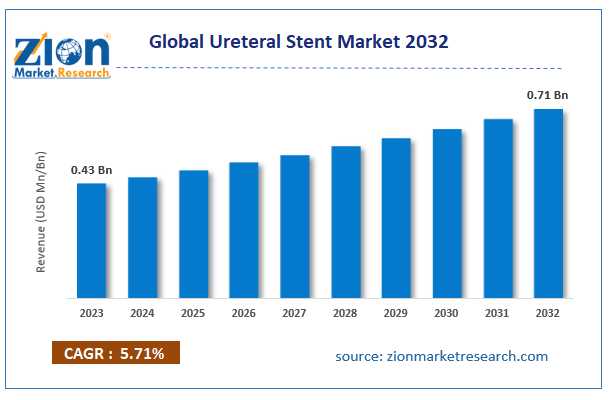Ureteral Stent Market Size, Share, Industry Analysis, Trends, Growth, Forecasts, 2032

Ureteral Stent Market - By Type (Closed End Stents, Multiloop Stents, Open End Stents, And Double Pigtail Stents), By Application (Ureterorenoscopy, Lithotripsy, And Schistosomiasis), By Composition Material (Silicone Stents, Plastic Stents, Coated Stents, Polyurethane Stents, Hydrogel Stents, And Metal Stents), By End User (Gastrointestinal Surgery Clinics And Hospitals), And By Region - Global And Regional Industry Overview, Market Intelligence, Comprehensive Analysis, Historical Data, And Forecasts 2024 - 2032-
| Market Size in 2023 | Market Forecast in 2032 | CAGR (in %) | Base Year |
|---|---|---|---|
| USD 0.43 Billion | USD 0.71 Billion | 5.71% | 2023 |
Description
Ureteral Stent Industry Prospective:
The global ureteral stent market size was worth around USD 0.43 Billion in 2023 and is predicted to grow to around USD 0.71 Billion by 2032 with a compound annual growth rate (CAGR) of roughly 5.71% between 2024 and 2032.
The report analyzes the global ureteral stent market drivers, restraints/challenges, and the effect they have on the demands during the projection period. In addition, the report explores emerging opportunities in the ureteral stent industry.
Global Ureteral Stent Market: Overview
Ureteral stents are made of plastic tubes. They are flexible and thin tubes that help in restoring the flow of urine through the blocked ureters. The block of the ureters can be due to various disorders. Ureteral stents are placed within the ureters through a surgery commonly known as ureteral stenting. The device’s one end is placed in the urinary bladder and the other end is placed in the kidney. To prevent the dislocation of the device the ends may be coiled.
Global Ureteral Stent Market: Growth Factors
The primary factors that are driving the ureteral stents market include the increasing aging population and the sedentary lifestyle which has increased the urological procedures. Other factors that will influence the rate at which the market will grow are an increasing number of people who are becoming obese, unhealthy dietary habits, less fluid intake, and the rise in the cases of metabolic disorders. New and advanced applications of the smartphone are available which helps in boosting the growth of the market for patient safety and stent case management, which is beneficial to both the patients and physicians. There are restraining factors that are affecting the ureteral stent market such as less availability of skilled surgeons, complications after removal of the stent, the stent placement procedure is complex, and difficulty in living with the presence of ureteral stent with side effects such as urgency to pass urine and increased occurrences of urination.
Global Ureteral Stent Market: Restraints
The global ureteral stent market encounters significant obstacles that impede its smooth growth. Patients often face significant discomfort and may experience various side effects during the process of ureteral stent placement. Having these stents in place, which are meant to ensure a smooth flow of urine from the kidney to the bladder, can often result in discomforting symptoms such as pain, a sense of urgency to urinate, and increased frequency of urination. In addition, the frequent need for interventions and stent exchanges can be a significant drawback.
This is often caused by issues like encrustation, bacterial colonization, and complications such as stent migration. The frequent interventions and extended duration of stent use have a significant impact on healthcare costs, adding to the economic burden. In addition, the market is limited by the absence of stent designs that effectively balance comfort, durability, and efficacy. To overcome these challenges, it is crucial to continuously invest in research and development. This will help in improving the materials used for stents, minimizing patient discomfort, and enhancing the overall effectiveness of ureteral stents. The goal is to achieve a better balance between the clinical benefits and the experience of the patients.
Global Ureteral Stent Market: Report Scope
| Report Attributes | Report Details |
|---|---|
| Report Name | Ureteral Stent Market Research Report |
| Market Size in 2023 | USD 0.43 Billion |
| Market Forecast in 2032 | USD 0.71 Billion |
| Growth Rate | CAGR of 5.71% |
| Number of Pages | 255 |
| Forecast Units | Value (USD Billion), and Volume (Units) |
| Key Companies Covered | Boston Scientific, Cook Medical, B. Barun, Allium Medical, Urotech, Opti-Med, Goharshafa, Mednova, Prosurg, Bard Medical, Coloplast, Applied Medical, Teleflex, Urovision, Surgimedik, and Taewoong Medical., and others. |
| Segments Covered | By Type, Application, Composition Material, By End-User, And Region |
| Regions Covered | North America, Europe, Asia Pacific (APAC), Latin America, Middle East and Africa (MEA) |
| Base Year | 2023 |
| Historical Year | 2018 to 2022 |
| Forecast Year | 2024 - 2032 |
| Customization Scope | Avail customized purchase options to meet your exact research needs. Request For Customization |
Global Ureteral Stent Market: Challenges
The global ureteral stent market faces various challenges that affect its overall growth and adoption. Various complications can arise from ureteral stent placement, including discomfort, urinary tract infections, and encrustation. These complications have a significant impact on both the well-being of patients and the financial burden of healthcare, necessitating further medical interventions. In addition, the need for regular stent replacement creates a continuous challenge for patients and healthcare systems, emphasizing the importance of finding new and creative solutions to enhance the longevity of stents. One of the challenges is the variation in patient response to ureteral stents, where certain individuals may experience more pronounced side effects compared to others.
The variability highlighted here emphasizes the significance of customized approaches and innovative stent designs to reduce any potential negative impacts. Furthermore, the market dynamics are made more complex by the competitive landscape and the availability of alternative treatment options. This necessitates manufacturers to tackle these challenges by making technological advancements, improving biocompatibility, and enhancing patient outcomes. These efforts are crucial for ensuring the long-term success of ureteral stents in clinical practice.
Global Ureteral Stent Market: Segmentation
The global ureteral stent market is fragmented into the application, type, composition material, and end user.
Based on application, the global market is segregated into ureterorenoscopy, lithotripsy, and schistosomiasis.
Depending on the type, the market is categorized into closed-end stents, multiloop stents, open-end stents, and double pigtail stents.
Based on composition material, the different composition materials are classified into silicone stents, plastic stents, coated stents, polyurethane stents, hydrogel stents, and metal stents.
Based on the end user, the market is bifurcated into gastrointestinal surgery clinics and hospitals.
Global Ureteral Stent Market: Regional Analysis
The geographical segmentation of the global ureteral stent market is diversified into North America, Latin America, Eastern Europe, Western Europe, Asia-Pacific, and the Middle East and Africa. The developed markets such as Europe and North America and Europe are expecting to witness rapid growth. Factors that contribute to this growth are the presence of prominent market players and rise in the number of urological surgeries, and constant research and development in the projects. Asia Pacific will have positive growth owing to patient demographics that are favorable and emerging healthcare infrastructure. The Middle East region has hospitals that are providing better services in urology.
Global Ureteral Stent Market: Competitive Players
The key market players that are involved in the ureteral stent market include
- Boston Scientific
- Cook Medical
- B. Barun
- Allium Medical
- Urotech
- Opti-Med
- Goharshafa
- Mednova
- Prosurg
- Bard Medical
- Coloplast
- Applied Medical
- Teleflex
- Urovision
- Surgimedik
- Taewoong Medical.
- And Others
The global ureteral stent market is segmented as follows:
By Type
- Closed-End Stents
- Multiloop Stents
- Open End Stents
- Double Pigtail Stents
By Application
- Ureterorenoscopy
- Lithotripsy
- Schistosomiasis
By Composition Material
- Silicone Stents
- Plastic Stents
- Coated Stents
- Polyurethane Stents
- Hydrogel Stents
- Metal Stents
By End User
- Gastrointestinal Surgery Clinics And Hospitals
Global Ureteral Stent Market: Regional Segment Analysis
- North America
- U.S.
- Europe
- UK
- France
- Germany
- Asia Pacific
- China
- Japan
- India
- Latin America
- Brazil
- The Middle East and Africa
What Reports Provides
- Full in-depth analysis of the parent market
- Important changes in market dynamics
- Segmentation details of the market
- Former, on-going, and projected market analysis in terms of volume and value
- Assessment of niche industry developments
- Market share analysis
- Key strategies of major players
- Emerging segments and regional markets
- Testimonials to companies in order to fortify their foothold in the market.
Table Of Content
FrequentlyAsked Questions
The kidney-bladder ureter receives a thin, flexible tube called a ureteral stent. Maintaining urine flow from the kidney to the bladder is used to treat kidney stones and obstructions. Stents are put during minimally invasive procedures to give temporary comfort, prevent problems, and aid healing. Urologists employ ureteral stents to relieve symptoms, improve drainage, and improve kidney function during treatment.
The primary factors that are driving the ureteral stents market include the increasing aging population and the sedentary lifestyle which has increased the urological procedures.
According to a study, the global ureteral stent market size was worth around USD 0.43 billion in 2023 and is predicted to grow to around USD 0.71 billion by 2032.
The CAGR value of the ureteral stent market is expected to be around 5.71% during 2024-2032.
The developed markets such as Europe and North America and Europe are expecting to witness rapid growth.
The key market players that are involved in the ureteral stent market include Boston Scientific, Cook Medical, B. Barun, Allium Medical, Urotech, Opti-Med, Goharshafa, Mednova, Prosurg, Bard Medical, Coloplast, Applied Medical, Teleflex, Urovision, Surgimedik, and Taewoong Medical.
The global ureteral stent market report covers the geographical market along with a comprehensive competitive landscape analysis. It also includes cash flow analysis, profit ratio analysis, market basket analysis, market attractiveness analysis, sentiment analysis, PESTEL analysis, trend analysis, SWOT analysis, trade area analysis, demand & supply analysis, Porter’s five force analysis, and value chain analysis.
HappyClients
Zion Market Research
Tel: +1 (302) 444-0166
USA/Canada Toll Free No.+1 (855) 465-4651
3rd Floor,
Mrunal Paradise, Opp Maharaja Hotel,
Pimple Gurav, Pune 411061,
Maharashtra, India
Phone No +91 7768 006 007, +91 7768 006 008
US OFFICE NO +1 (302) 444-0166
US/CAN TOLL FREE +1 (855) 465-4651
Email: sales@zionmarketresearch.com
We have secured system to process your transaction.
Our support available to help you 24 hours a day, five days a week.
Monday - Friday: 9AM - 6PM
Saturday - Sunday: Closed







